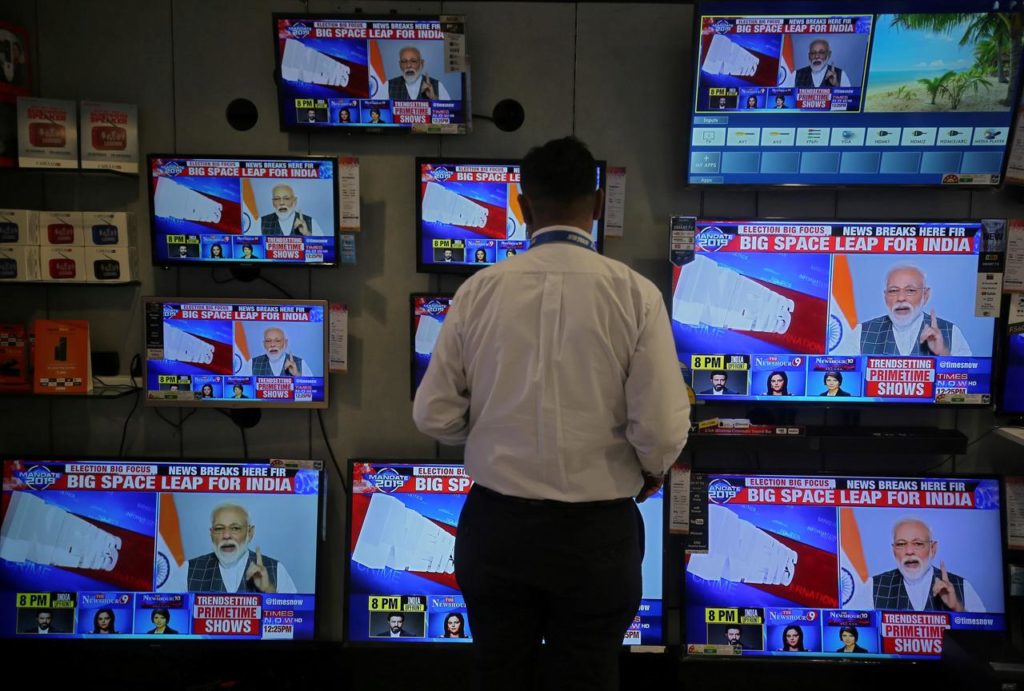Editors Guild Terms Draft Broadcast Services Bill ‘Excessively Intrusive’
Jan 16, 2024 | Pratirodh Bureau
FILE PHOTO: A person watches Prime Minister Narendra Modi addressing the nation, on TV screens inside a showroom in Mumbai
The Editors Guild of India (EGI) has expressed concerns that the draft Broadcast Services (Regulation) Bill, circulated by the government, is “vague and excessively intrusive”.
The Guild, in a letter to Union Information and Broadcasting Minister Anurag Thakur said that the new bill would prove “adverse to the spirit of freedom of speech and freedom of the press guaranteed by the Constitution” and lay the ground for the creation of an “overarching censorship framework” through the establishment of a broadcast advisory council.
The Guild, outlining four major concerns, said the Bill would result in an “overbearing system of self-regulation” mandating the creation of content evaluation committees in a manner that will allow the government to have a greater degree of control on those committees.
The press body expressed concerns about the bill allowing the government to regulate, or even prohibit, the transmission of channels or programmes on vague grounds.
In a letter dated 7 December 2023, which was made public on Monday, 15 January, the Guild said, “Provisions that allow government excessive delegation of rule-making are also problematic as they lead to uncertainty for the stakeholders who may be impacted by the draft bill and prevent individuals from being fully informed so as to meaningfully engage in the consultation process.”
The Broadcasting Services (Regulation) Bill, 2023 is a proposed law that aims to overhaul the regulatory framework for broadcasting services in India. It would replace the outdated Cable Television Networks (Regulation) Act of 1995 and encompass a wider range of platforms and technologies.
On 10 November 2023, MIB India introduces this broadcasting bill, which included Programme code with Content Evaluation Committee (CEC) for every OTT platform. Currently public consultation is ongoing.
The bill proposes establishing a new regulatory body called the Broadcasting Authority of India (BAI) to oversee the implementation of the bill and regulations. Other proposed changes include:
- Data localization: Requirement for certain platforms to store data in India.
- Self-regulation: A two-tier system of self-regulation with an option for government intervention in case of non-compliance.
- Content evaluation committee: A committee to evaluate content and certify its compliance with the code.
- Transparency and grievance redressal: Measures to ensure transparency in decision-making and provide viewers with effective grievance redressal mechanisms.
The stated objectives of the bill are:
- Consolidation: To bring all forms of broadcasting under a single, streamlined regulatory framework
- Content regulation: To address issues like hate speech, fake news, and violence through content codes and age verification mechanisms
- Promoting local content: To increase the presence of Indian programming across all platforms
- Viewer protection: To safeguard viewers’ interests by ensuring program quality, transparency, and grievance redressal mechanisms
- Balancing freedom and accountability: To uphold freedom of expression while holding platforms accountable for harmful content
The broad scope of the bill, encompassing even individual content creators, raises concerns about government overreach and potential censorship. Critics argue that vague content codes and subjective interpretations could stifle creative expression and limit the diversity of voices.
The two-tier self-regulation system, with government intervention as a backup, might not provide adequate safeguards against arbitrary decisions and suppression of dissent. The emphasis on promoting “Indian content” and regulating harmful content could lead to unintended consequences for freedom of expression. Critics argue that defining “Indian” and “harmful” subjectively could be used to suppress critical voices and diverse perspectives.
The bill’s provisions for data localization and government access to user data raise concerns about privacy violations and potential misuse of information.
